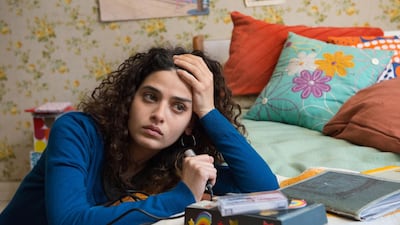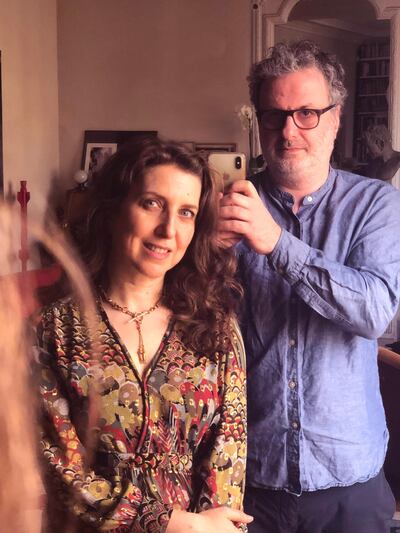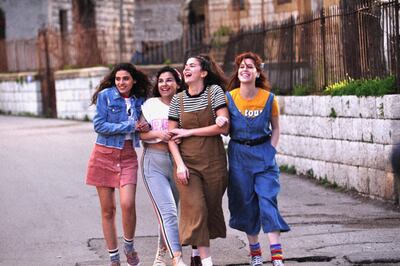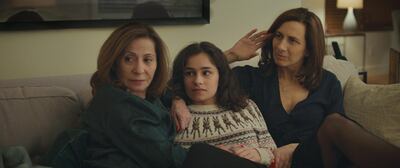One sad thing about the digital age is no one seems to send letters or print photographs any more. The analogue era may have been slower and more cumbersome, but having tangible keepsakes as reminders is surely a nicer way of holding on to memories than scanning through a computer hard drive.
Nearly everyone over a certain age has a box filled with old letters, souvenirs and photographs stored away somewhere – a capsule to the past.
This idea, along with the vagaries of time are explored brilliantly in Memory Box, the new film from co-directors Joana Hadjithomas and Khalil Joreige, which is playing in competition at the Berlin International Film Festival this week.
Memory Box stars Rim Turki, Manal Issa, Paloma Vauthier and Clemence Sabbagh, and is set over Christmas in Montreal. A surprise delivery of notebooks, tapes and photos that single mother Maia (Turki) sent to her best friend Liza in the 1980s is quickly consigned to be stored unopened in the basement, but Maia's curious daughter Alex (Vauthier) begins looking through the keepsakes, which give her a window into her mother's adolescence
The film jumps between past and present as Alex discovers hidden stories about her mother's hopes and fears as bombs ravaged Beirut during the Lebanese civil war. She learns of the conflict's impact on her family as well as on the country.
The film is freely adapted from correspondence that Hadjithomas herself sent and received between 1982 and 1988. She was reminded of her own collection of memories in 2013, when she and her partner Joreige were putting on an exhibition in Paris to accompany their documentary The Lebanese Rocket Society, about an attempt by university students to enter the international space race in the 1960s.
"My friend left Lebanon in the early 1980s," Hadjithomas tells The National from her apartment in Paris, with Joreige by her side.
"She went to live in Paris, and I stayed in Lebanon. We decided that we were going to write to each other every day, and we did for six years, not just writing but also recording songs from the radio and our own thoughts on tapes, and sending them to each other. Then we lost contact and met 25 years later …"
Joreige interrupts and continues the story: "She came to our exhibition. She had seen it advertised on Facebook and decided to come."
Hadjithomas and her friend went for a coffee. It was an emotional occasion where they discovered both had kept each other’s correspondence from all those years ago. They swapped their boxes.
“When I read those notebooks, there was something very deceptive about them and great also,” says Hadjithomas.
“The deceptive part is that I was not so interesting, in a way. I was a teenager, I wanted to live, to love, to have dreams, fight with my parents, very normal, but what was great was that I was writing daily and because I was bored, it was the civil war, my parents didn’t want me to go out, we were in a shelter for days, so I used to give a lot of very specific details.”
Joreige says: "Our daughter, who was around the same age Joana was, wanted to read the diaries. We had a lot of questions about what impact it would have on our daughter on a psychological level, and also about the understanding of the context. When it's written, there is a bombing, what does that mean? It's abstract for a person who doesn't live it."
Ideas swirled around the couple's minds. They knew they wanted to make a narrative out of it, but were not exactly clear how they would put it together. For the first time in their illustrious artistic careers, the pair decided to employ a third person, scriptwriter Gaelle Mace, to help them mould the story.
“We decided to make a film with a much bigger budget than we are used to,” says Joreige. “We also wanted to go to Canada and have a country that is far away.
The snow was also important to the film's aesthetic, says Hadjithomas, while Joreige highlights the importance of the two women's confinement because of the storm: "It's the fashion to be confined, but we wanted two women stuck in a house, which is why they have time to dig through the memories."
The directors began casting the film in 2018. The process took some time because the couple do not give their script out to actors. However, they knew they wanted Turki – an actress who was in The English Patient, Munich and Yusri Nasrullah's Bab el Shams, but had disappeared from screens for more than a decade – to play Maia.
"We felt that she could give to the character this strong and weak part at the same time. We did a long casting, and then we came back to her and asked her very nicely, and she said: 'OK, I will do it.'"
To play a young Maia, they quickly decided upon rising star Issa. The search for an actress to play Alex took longer., but they eventually landed on French newcomer Vauthier, finding out only after they cast her that she had a Lebanese father.
"Casting also took a long time because we had two temporalities – the 1980s and today – and we had to build a coherent family and find the friends who would suit both time periods," Hadjithomas says.
Many hours were also dedicated to recreating the notepads and photos. While Hadjithomas's writings inspired the narrative for Memory Box, they looked at newspaper reportsto create the look and feel of the film, as well as photos Joreige had taken at the time. "We took 10,000 new pictures and processed them like it was the 1980s," Joreige says.

Music is also a big part of the film. Blondie's One Way or Another reverberates through it, as does the use of animation as Alex imagines what Lebanon was like at the time through her mother's words. These scenes recall a-ha's Take on Me video.
"We wanted to give the taste and feeling of the energy of Lebanon at the time," says Joreige, while Hadjithomas says she " also wanted what I was listening to, the songs we found on the tapes".
The film is also a rare and remarkable look at the Lebanese civil war from a woman's point of view.
"Women are less represented in stories of war, but they are the survivors," Hadjithomas says. "They don't just look after the house; they have the strongest way to deal with memories and history. They are survivors, but they take control of their lives more than men in a way."
Memory Box premiered at the Berlin International Film Festival which runs until Friday; berlinale.de





